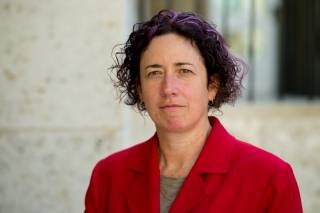Meet the Expert: Joanne Santini
13 July 2021
Professor Joanne Santini is a Professor of Microbiology in the Department of Structural and Molecular Biology, which is part of the Division of Biosciences.
Her work focuses on a wide range of areas, namely arsenic metabolism, microbial bioleaching, extremophiles, bacteriophages, and gut microbiomes.

Did you always know that you wanted to follow a career in microbiology?
Answer: As a child I was fascinated by animals and animal behaviour and wanted to be a zoologist. I embarked on a BSc with the view of becoming a zoologist. This then turned to an interest in molecular genetics and then molecular microbiology.
The common theme was the molecular and interest in how things work so explanations for phenotypes whether it be in humans or microbes. For my 4th year research project (I completed my BSc with a 4th year honours project) I studied floral development in Arabidopsis (E. coli or Drosophila of the plant world).
My PhD was a different topic where I studied the inhibition of bacterial “sex” (conjugation). Conjugation is probably the most common mechanism for the spread of antimicrobial resistance. This is where my career in microbiology really started. It wasn’t until I was a research assistant that I really thought “wow these microbes are really amazing” and that led me to isolating new organisms that could metabolise toxins like arsenic. I guess I was then hooked. I know that I am biased but microbes really are the coolest creatures on Earth.
How has COVID-19 impacted on your research and has it changed the focus of your research in any way?
Answer: Funnily enough COVID-19 got me thinking about viruses and their selfishness – they are amazing replicators. I have recently moved into the field of virology, studying bacterial viruses so COVID-19 made me think about viral host range and the movement of viruses between animals and humans. It is our work on bacterial viruses in the gut that got me thinking about whether SARS-CoV-2 could move from humans to animals. We managed to do some work on this and got a few papers out on the topic. So, I guess it focussed my thinking a little on a topic I have always been interested in.
Can you tell us about what drove you to develop a low-cost, portable solution for detecting arsenic in water?
Answer: 150 million people are drinking water with unsafe levels (i.e., above 0.01 mg/L) of arsenic, this includes 1/3 of the population of Bangladesh. Key to any mitigation strategy is detection. The road to the development of a cheap, easy-to-use and sensitive biosensor was a long one which started in Australia in 1999 (after my PhD). I needed to first isolate an organism that could metabolise arsenic, then there were many years of studying how it does this. This all culminated in our invention.
What advice would you give to any budding microbiologists?
Answer: I think key to all research is to find something you’re passionate about, ask questions (you can never ask too many questions), keep an open mind and constantly challenge yourself. Also, join societies, meet people and have fun.
What motivates you at the start of each day?
Answer: Depends what I am doing that day. The best work days are the ones where I head into the lab. It’s the best feeling. It’s for me where I find peace. I can forget about the outside world and what is going on and focus on the research. Just wonderful.
What is your next big challenge?
Answer: I have a load of research questions I would like to address. I guess the biggest challenge is still to find a way of providing people with clean drinking water. I am also keen to understand the role of bacteriophages (bacterial viruses) in health and disease. We recently discovered some huge/megaphages – I want to know why they are so big and understand whether they can be transmitted between humans and animals. Host-range as I have said previously is something that has always fascinated me. The greatest challenge of course is getting the funding. In terms of microbiology and my role as Microbiology@UCL Domain lead, I would like UCL to see its importance not only in infection but also in other areas such as promoting health and preventing disease, helping us tackle climate change etc.
Further Information:
- Professor Joanne Santini profile
- Santini Lab page
- Department of Structural and Molecular Biology
- Microbiology at UCL
- Joanne Santini discusses the role of arsenite-oxidising bacterium NT-26 in the development of an arsenic biosensor on BBC World Service People Fixing the World.
 Close
Close

